Monarch Survivors in a World of Climate Change
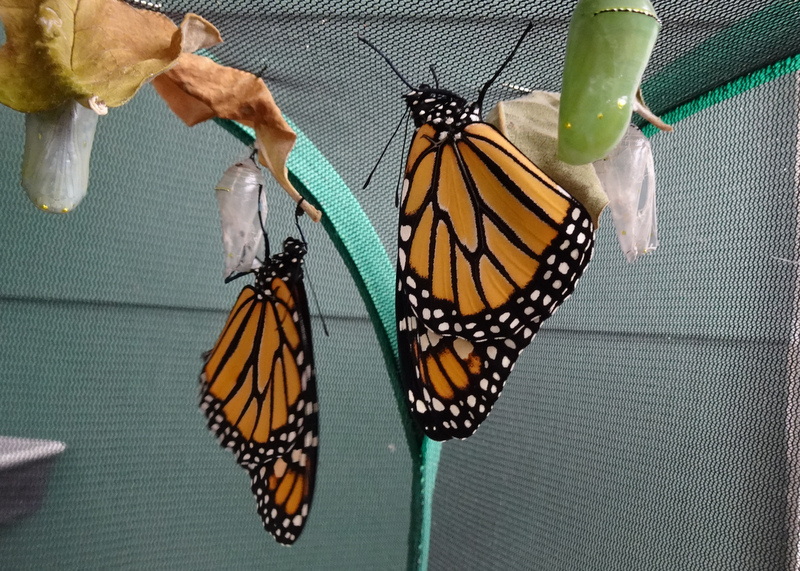
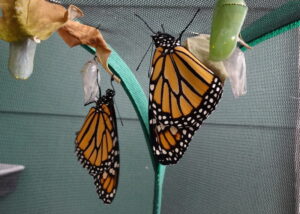 This year, I rarely see an adult Monarch butterfly in the fields or in my butterfly garden. There are some out there because they leave evidence– a few tiny Monarch eggs deposited under milkweed leaves. It I search long enough, I might find three or four eggs in an hour. Sometimes I don’t find any.
This year, I rarely see an adult Monarch butterfly in the fields or in my butterfly garden. There are some out there because they leave evidence– a few tiny Monarch eggs deposited under milkweed leaves. It I search long enough, I might find three or four eggs in an hour. Sometimes I don’t find any.
By mid August 2022, I’d released 160 Monarchs raised in my back porch nursery. It was easy to find eggs on the milkweed that year, so I brought them into the mesh insect crates to protect them from hungry spiders and ants. I also wanted to admire them. I’ve had success protecting them in an outside nursery since 2018, but where were the Monarchs this year? Only a few arrived.
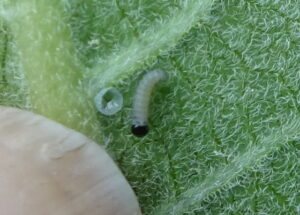
In 2022, last year, my first Monarch flew on June 30. In 2023, one female Monarch showed up in my butterfly garden in late July and left a few eggs on the milkweed leaves before moving on. I picked those leaves with the eggs attached before the spiders devoured them. They hatched and grew on milkweed in my nursery.
I kept looking for eggs as I walked with my dog. I almost never saw a Monarch butterfly but found a few more eggs for the nursery. Eight chrysalises eclosed in mid August and flew up into the trees or went south like migrators. They didn’t hang around in the flowers like June egg layers in the past.
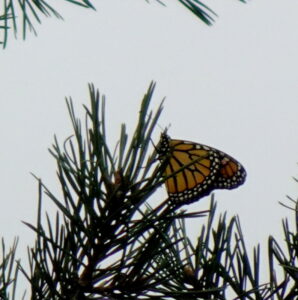 By late August, I’d found forty eggs and a few tiny caterpillars, about ¼ of what I found last year. More Monarchs are spotted in other parts of the country, but they’re rare in the NY Finger Lakes this year.
By late August, I’d found forty eggs and a few tiny caterpillars, about ¼ of what I found last year. More Monarchs are spotted in other parts of the country, but they’re rare in the NY Finger Lakes this year.
The Monarch census in Mexico estimated a 22% reduction last spring. This was before the extreme weather of 2023. Besides weather changes, Monarchs lost habitat to loggers who cut down the fir trees where they gather in winter. Over time, their major migration route became corn and soybean fields and herbicides killed much of the milkweed they need to survive. The Monarchs hardly have a chance. It’s heartening to know more people plant milkweed and nectar plants for Monarchs. We’ve become aware of their need for help.
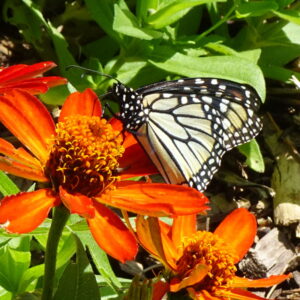
Each Monarch egg I find in my milkweed fields is a miracle. Each is a promise of transformation. As they emerge from the chrysalis and dry their wings, it’s time to leave my protection. They cling to a tree branch or catch a ride from the north wind. It’s a wonder any made it this year with fierce smoky June Canadian winds blowing them west or south and blocking their usual northern trip, but a few made it. I’ve raised about sixty from eggs found in the milkweed fields.
Monarchs are survivors, but for how long? I could ask the same question about every living thing, including myself.
Are you a gardener or grower? Do you avoid sprays that will harm insect pollinators or make an effort to protect habitat such as participating in No Mow May or planting what the pollinators love? My fields have been loaded with milkweed since I moved here in 1972 and we never sprayed. Let me know if you’re doing something to protect pollinators or wildlife to help their odds for survival. You can learn more about protecting butterflies at the Xerces Society for Invertebrate Conservation.
For other posts about Monarchs, see Dancing with Monarchs, Defying Despair. To see a series of photos about the transformation of a chrysalis to a Monarch butterfly, see Somersaulting into Life: A Monarch Butterfly Birth (in Photos).

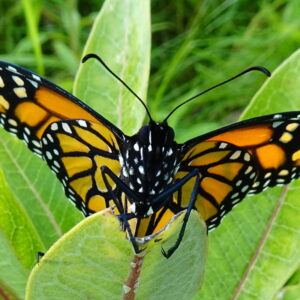
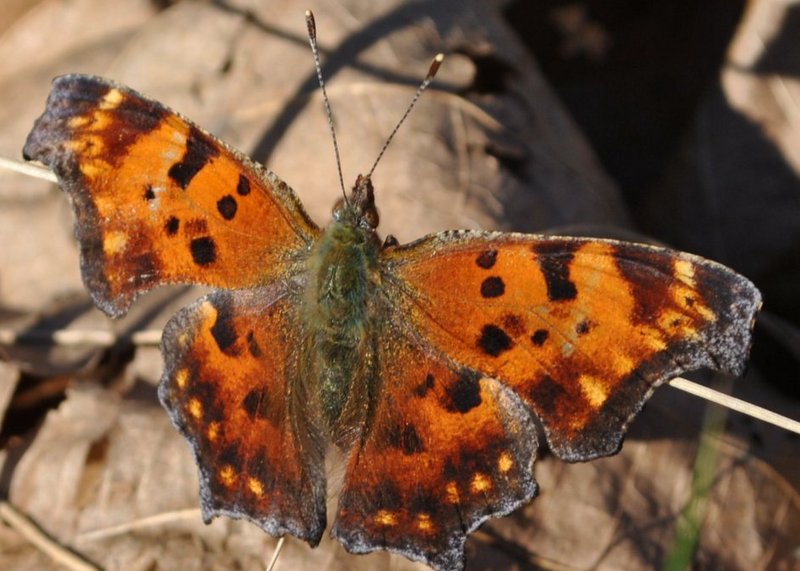

September 10, 2023 at 6:26 am
Lin Gregory
Thank you for your posts, Elaine – I always enjoy them and have finally rebuilt my website and returned to blogging myself. I so admire your dedication to the Monarch’s survival Elaine – a trial requiring a great deal of patience as well as love! Perhaps the fact that more people are planting milk weed in their gardens to replace that lost in the fields will mean in future years more people will get to enjoy memorable encounters with these beautiful butterflies closer to home…and create their own Monarch nurseries to help the population and hopefully spread the word further.
We have a small garden but I have tried to fill it with butterfly and bee friendly plants like helianthus, echinacea, rudbeckia, helenium, verbena bonariensis, giant echiums (which the bees love) and of course zinnias. Although we didn’t have many in early summer thanks to cold, wet and windy weather the past two months has seen a profusion of red admirals, gatekeepers, small coppers and of course the ever reliable large and small whites. I’ve also noticed of an evening more moths than usual – perhaps drawn by the warm early autumn evenings we’re currently experiencing. Hopefully this Indian Summer in the UK will help the bee and butterfly populations recover from the disastrous start they had this year.
September 10, 2023 at 1:52 pm
Elaine Mansfield
Thank you for commenting, Lin. I signed up for your website once, but that may not work for the new site. I’ll check. I released eight Monarchs thiw morning even thought it was too cool and wet, but they were frantic to leave since they’d eclosed yesterday morning. The weather warmed and dried a bit by noon, so it was a good decision. Gardeners are helping, but there are still many commercial growers who use herbicides and in Mexico loggers illegally cut the trees where Monarchs winter. They’re struggling with climate change like all of nature, but a new permanent nonmigrating colony was just found in a southern state on the Atlantic Ocean–so they find a way. We grow many of the same plants, but I’m not familiar with Giant Echium. We don’t have Gatekeepers here, but I have the other butterflies although Red Admirals, those beauties, are rare. Whatever entices the bees and butterflies in verious neighborhoods is OK with me. Despite a slow start here, the Monarchs are having a decent finish. Love to you and Deborah.
August 31, 2023 at 3:18 pm
susan scott
A lovely post in spite of the distress of falling numbers of Monarchs Elaine. Those pesticides are a curse upon the land. I don’t know what to say about the fires and smoke and damage in all parts of the world … except to fantasise about Mother Nature showing us in clear and explicit non verbal language what WE are doing to our precious planet.
Keep up the good work Elaine. You are an inspiration to us all.
September 5, 2023 at 8:23 pm
Elaine Mansfield
Thank you, Susan. They’re doing better than I thought they would, so I’m grateful for their beauty. I wasn’t sure there would be any. Their population struggles, but some find a way to survive. I agree Mother Nature speaks–and She’s not messing around. I released six Monarchs today and they looked healthy. I hope you and your family are doing well as youe head toward longer days.
August 30, 2023 at 9:05 pm
Jean Raffa
Your post is beautiful and inspiring, as are all of your monarch butterfly stories. Thank you for being a spokesperson for these beautiful gifts of summer and harbingers of the compromised health of our world. May your manuscript about your experiences with them become a book that is an inspiration for all of us who care about the legacy we are handing down to our grandchildren. Love, Jeanie
August 31, 2023 at 11:34 am
Elaine Mansfield
Thank you for the blessing, Jeanie. I wonder if you’re in North Carolina and you see Monarchs there. I think you’re far enough west in NC to have missed the worst of the storm, but maybe you weathered it in FL. I hope your family is OK. May Monarchs thrive next year in increasing numbers. My manuscript waits for me to be inspired to finish it. I’m almost there, but not quite. This summer took the wind out of my sails creatively and physically, so I’m waiting for a surge of energy.
August 30, 2023 at 8:15 am
Marian Beaman
This brightened my spirits: “My sons are gardeners, so I must have done something right.” Of course, you have, Elaine!
We are watching weather reports now, and it appears the hurricane has made landfall, but of greater concern now are the tornadoes developing much farther east into Georgia. Thanks for your concern!
August 30, 2023 at 2:31 pm
Elaine Mansfield
I hope all is well in your corner of Florida. We’re all having to deal with weather madness, but there are no hurricanes here–only snow storms coming in a few months. Be safe.
August 30, 2023 at 4:13 am
Aladin Fazel
It is great to hear that Her Majesty is still alive! Additionally, it is beautiful that you are taking care of such a stunning and vital creature for Mother Nature and all of us. Our sitting room has a butterfly tree outside the window, and I enjoyed many butterflies fluttering around last year. I have yet to see a single one. Take more care of yourself, dear Elaine Blessing.
August 30, 2023 at 2:29 pm
Elaine Mansfield
Thank you, Aladin. The weather has been off all summer. I hope they can adjust. I hope I can adjust. Have a day with a touch of love and beauty to balance the hard stuff.
August 29, 2023 at 7:17 pm
Marian Beaman
Dear Elaine, I felt the up and down e-motion of your post. First saying: The Monarch census in Mexico estimated a 22% reduction last spring. But then: “It’s heartening to know more people plant milkweed and nectar plants for Monarchs. We’ve become aware of their need for help.”
Now I wonder if the change this year is a blip in the cycle or a sustained downward trend.
Although our neighbors in my community regularly spray, we don’t. Trucks with pesticides circulate on Mondays and through the week, but we don’t have such a service. In a word, we do avoid sprays that will harm insect pollinators.
Growing up rural and close to the earth in my Pennsylvania childhood, I have been taught to respect nature and help maintain its delicate balance. We have taught our children to do the same.
August 29, 2023 at 9:01 pm
Elaine Mansfield
Marian, I sometimes fail at “let go and let god(dess).” I worry the Monarchs are going extinct, but more people seem concerned, so there’s hope. I guess we’ll know this winter and coming spring about the downward trend because it may be primarily local because of the Canadian winds. We’ll see, but there’s been a sustained Monarch downward trend since chemical farming began. I’m glad you don’t spray to give a few insects a chance. I hope this huge hurricane isn’t damaging your area.
I have a feeling for how well kept your childhood farm must have been from watching the Mennonite farmers north of me. The teams are plowing and harvesting and planting–and the Mennonite Greenhouse is the best place to buy autumn plants like mums and daffodil bulbs. My sons are gardeners, so I must have done something right.
August 29, 2023 at 12:24 pm
Deborah Gregory
Dear Elaine,
It’s heart-breaking to hear that Monarch numbers are falling! We’ve had a challenging summer in the UK too with butterflies only arriving in our garden from mid to late July. June, their usual arrival date, didn’t happen due to it being a complete washout with uninterrupted rain and windstorms for the entire month … so hardly surprising it took another couple of weeks for the first, a white admiral, to arrive. Today, it’s another cold, windy and overcast day here with the smell of rain hanging in the air … again! Nevertheless, as you so rightly say, thankfully, many of our butterflies are hanging on, surviving these climate changes.
Thank you so much for sharing yet another of your wonderful posts my dear friend! Me, I could never grow tired of admiring those beautiful, stained glass, orange wings … I do wish they would fly here! This week we’re having a variety of butterfly visitors to our garden, fluttering over the verbena, helianthus and heleniums. I do love how verbena plants keep growing and flowering well into early autumn. Wow, you’ve released six-oh Monarchs, that’s a huge number E, so huge congrats on managing this many during what has been such a scarce year in your area. Sending you much love, light and laughter across the oceans and oaks between us.
Love and blessings,
Deborah
August 29, 2023 at 8:48 pm
Elaine Mansfield
Deborah, a White Admiral is a great way to start a season fraught with concern that warm, dry weather will never come. It was beautiful here today and katydids and crickets are playing their end of summer symphony outside my open windows. I still don’t see Monarchs often, but they left their gifts. I never see an egg now, so I think the Monarchs I’m raising are migrators. (Migrators don’t lay eggs until springtime in Mexico.) Seven are still tiny, so they’ll be around until the end of September while others are in chrysalis. As I find young milkweed shoots for them, raise them, and release them, it won’t seem silly that I spent hours searching for eggs in the milkweed. Obsession pays off! Wishing you delicious weather, autumn fruits, and apple cobbler. I return that love and laughter under full moon light. Warmly, Elaine